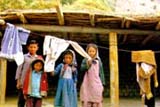At 7, Sunita feeds her drunk father, ailing mother and two brothers
 Sunita’s livelihood depends on her outstretched palm. On the same palm rests the fate of two younger brothers, an ailing mother and a drunken father. Sunita is a beggar.
Sunita’s livelihood depends on her outstretched palm. On the same palm rests the fate of two younger brothers, an ailing mother and a drunken father. Sunita is a beggar.
After completing the domestic chores, Sunita rushes off to one of New Delhi's busy traffic intersections to seek alms. Sunita is also seven years old.
Though Sunita and her brothers want it, they can’t consider the luxury of school. Their parents don’t insist on it either. After all, they depend on her for their living and time spent away from the crossroads means that much less income. They also don’t put much store by the constitutional guarantee of primary education to children.
There are hundreds of children like Sunita begging or working in dhabas in the capital, exploited by their parents and, sometimes, by organised groups.
"I’ll give this money to my uncle," says a four-year-old girl clutching a bunch of coins at the Bikaji Kama traffic intersection. But she doesn’t know the name of her ‘uncle’ who gets drunk and beats her if she doesn’t return with enough money. He drops her at the junction in the morning and picks her up in the evening.
"Begging is an art," says 12-year-old Ramu who claims he earns Rs 100 to Rs150 a day. "If you go to a Fiat car owner you cannot expect much but Cielo or Contessa walas offer Rs 10 to Rs 20."
Increased competition has reduced the earnings of these children, so some of them have taken to selling newspapers and toys in addition to seeking alms. The problem is aggravated by the presence of many immigrants, including refugees.
 Organisations working in the field of child labour have not been able to solve the problem, nor has the government. Unlike pavement sellers who at least have to spread their wares, these children just have to stretch their arms at the appropriate time, and so are more difficult to control. They are exploited by the drug mafia and exposed to sexual abuse. But there are few non-government organisations looking into their problems because there is more funding for child labour, drugs and AIDS.
Organisations working in the field of child labour have not been able to solve the problem, nor has the government. Unlike pavement sellers who at least have to spread their wares, these children just have to stretch their arms at the appropriate time, and so are more difficult to control. They are exploited by the drug mafia and exposed to sexual abuse. But there are few non-government organisations looking into their problems because there is more funding for child labour, drugs and AIDS.
The Eighth Plan has introduced a scheme to prevent beggary, aiming to impart education and vocational training to these children. Several states too have enacted anti-beggary legislation which includes plans to set up institutions for detention, treatment, training and rehabilitation. But there’s a singular lack of will evident in the implementation of these plans.
So children like Sunita continue cringing before car windows, hoping they can cadge enough money to pay for her father's evening drink.
|





